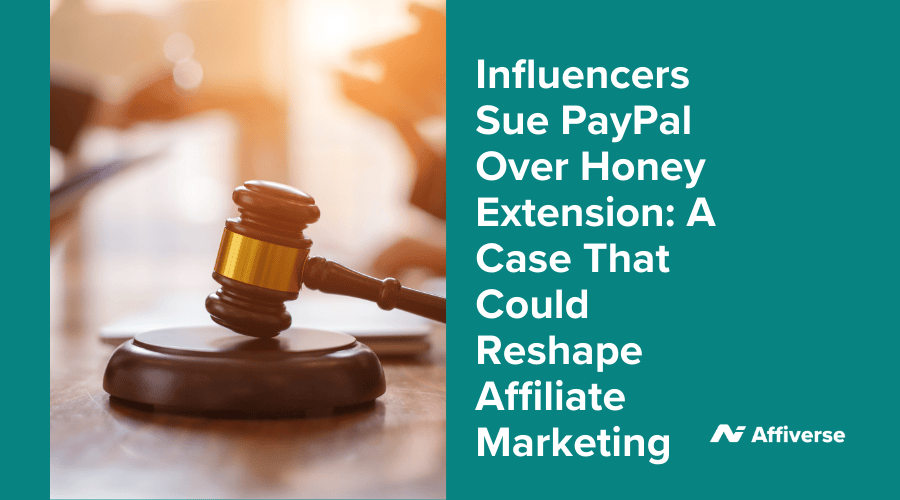Influencers Sue PayPal Over Honey Extension: A Case That Could Reshape Affiliate Marketing

PayPal is facing legal trouble after influencers filed a class-action lawsuit against the company, claiming its Honey browser extension is unfairly claiming affiliate commissions that rightfully belong to them. The case has caught the attention of the affiliate marketing world, as its outcome could set a major precedent for how affiliate earnings are tracked and distributed.
The lawsuit highlights the growing complexities in an industry that increasingly relies on automation, tracking technology, and partnerships between creators and brands. If the allegations hold up, the case could force companies like PayPal to rethink their approach to affiliate tracking tools and transparency.
The allegations against Honey
Honey is a browser extension owned by PayPal that helps users find and apply discount codes when shopping online. It also tracks user purchases and claims commissions through affiliate links, earning money when a user buys a product via its recommendations.
The influencers behind the lawsuit argue that Honey is “stealing” commissions by overriding their affiliate links. For example, if an influencer promotes a product and directs their followers to buy it using their unique affiliate link, Honey may intercept that sale by applying a discount code, redirecting the commission to itself.
This practice, the lawsuit claims, unfairly disadvantages influencers and other affiliates who put significant time and effort into promoting products. The influencers allege that Honey’s tracking mechanism unfairly overrides theirs, cutting them out of their deserved earnings.
Why this matters
Affiliate marketing relies on trust, transparency, and fair compensation. Affiliates—including influencers, bloggers, and other content creators—spend time building their platforms, crafting content, and recommending products they genuinely support.
Their work often includes hours of research, content creation, and audience engagement to earn a commission when a follower makes a purchase through their unique link. If tools like Honey are diverting these commissions, it undermines the entire affiliate ecosystem.
This case also highlights a broader issue: as technology in affiliate marketing becomes more advanced, the lines between fair competition and exploitation are increasingly blurred. Browser extensions, cashback sites, and coupon aggregators have gained popularity, but they also complicate how commissions are attributed.
The potential impact
The outcome of this lawsuit could have significant repercussions for the affiliate marketing industry.
1. Changes in affiliate tracking rules
If the court rules against PayPal, companies may be forced to adopt stricter affiliate tracking protocols. This could include better transparency around how commissions are attributed and limitations on how tools like Honey operate.
2. Increased awareness among creators
The case is already raising awareness among influencers and other affiliates about the risks associated with certain browser extensions and affiliate tools. Creators may start to demand more accountability and transparency from platforms and brands they work with.
3. Legal precedents for affiliate marketing
The lack of clear regulations in affiliate marketing has led to a “wild west” scenario where tracking overlaps and commission disputes are common. This lawsuit could provide much-needed clarity and establish legal precedents that protect affiliates.
4. Changes to browser extensions
Browser extensions that rely on affiliate revenue might need to modify their practices to ensure they don’t override other legitimate affiliate links. This could involve working more closely with creators and brands to share revenue fairly.
A growing problem in the industry
The issues raised in this lawsuit reflect a broader trend in affiliate marketing. With the rise of tools like Honey, cashback sites, and coupon platforms, traditional affiliates often find themselves competing for commissions in a crowded space.
While these tools provide value to consumers, they can disrupt the affiliate chain. For instance, an influencer might drive a purchase through their content, but a browser extension could step in at the final moment to claim the commission by applying a discount code.
This is particularly problematic for smaller affiliates and influencers, who rely on commissions as a primary source of income. If their efforts are undermined, it could discourage them from participating in affiliate marketing altogether.
What’s Next?
PayPal has yet to issue a detailed response to the lawsuit, but the case is likely to attract significant attention in the coming months. The company may argue that Honey’s practices are legal and that the extension is simply meeting consumer demand for discounts.
Meanwhile, the influencers behind the lawsuit are pushing for greater accountability and fairness in affiliate marketing. Their argument is straightforward: commissions should go to the affiliates who drive the sales, not to tools that intercept the process at the last moment.
Final thoughts
The lawsuit against PayPal’s Honey extension has brought to light a key challenge in the affiliate marketing industry. As technology evolves, so too must the rules and standards that govern it.
For now, the case serves as a wake-up call for creators and brands to review their partnerships and tracking systems carefully. Whether or not the influencers win their case, the conversation around fairness and transparency in affiliate marketing is one that the industry can no longer afford to ignore.
If successful, this lawsuit could reshape affiliate marketing, ensuring that commissions go to those who truly earn them. For influencers, bloggers, and other affiliates, this could mean a more equitable future in an increasingly competitive landscape.






